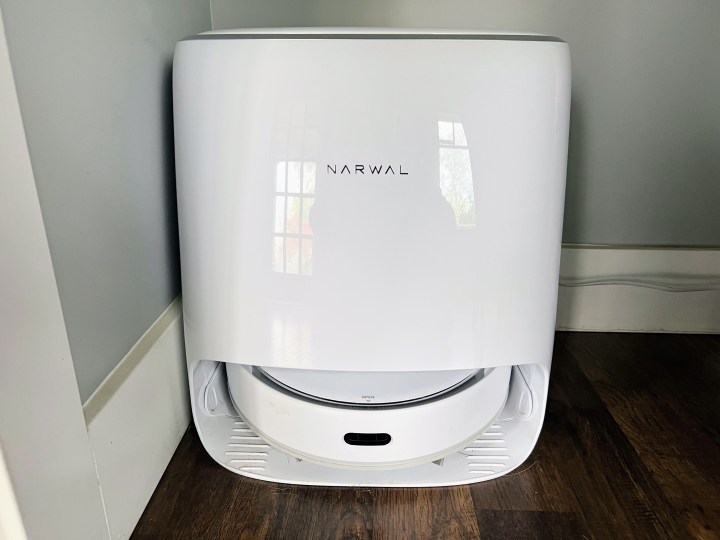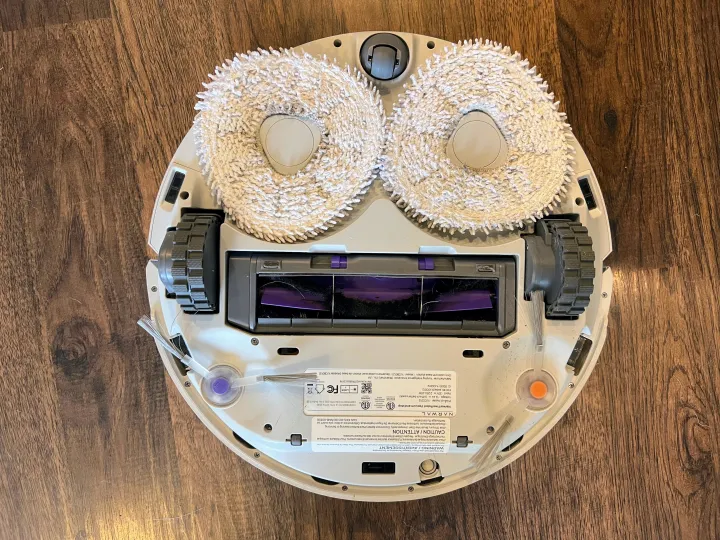- Squeaky clean mopping results
- Meticulous vacuuming
- Dirt sensors trigger extra cleaning
- Compact dock with LCD control panel
- Easy setup
- Quiet operation
- Doesn’t tell you when it gets stuck
- Long cleaning times
- Base station does not empty vacuum
- App not as polished as competitors'
There’s never been a better time to be lazy. While robot vacuums have become as commonplace as Instant Pots, a new generation of vacuum-mop combos has taken things to the next level over the last few years. And they’re just now maturing past the overpriced “early adopter” phase with the arrival of practical models you may actually want to buy.
Narwal, though you may not have heard of the company, has been leading the charge. It launched the “world’s first self-cleaning robot mop and vacuum” on Kickstarter in 2019, and defied all odds by not only delivering a product, but a pretty good one. The Freo is an evolution of that early effort that competes with other all-in-one bots like the Roborock S7 Max Ultra, Roomba Combo j9+, and Ecovacs Deebot X2 Omni.
All of them offer mopping and vacuuming with base stations that automatically scrub the mops, but Narwal stands apart with its DirtSense technology, which allows the robot to measure the filth in your floors and keep going back to problem areas until they’re clean. While that makes it one of the most impressive robo cleaners we’ve ever tested, some rough patches in its app mar the experience a bit.
All the bells and whistles
Priced at $1,199, this is a premium robot vacuum, and the packaging belies Narwal’s luxurious aspirations. From the perforated tab you pull to open the package to the custom Narwal logos embossed in the packaging foam, it feels expensive.

This white-glove experience extends to the setup, which goes as smoothly as you’d expect: download the app, slide the Narwal in its base station, connect with Bluetooth, and give it your Wi-Fi details.
I won’t burn too many words describing the Narwal itself, which looks and feels so close to every robot vacuum I’ve ever handled that it makes me question whether they might all come from the same factory. The glossy white finish stands out more than anything, giving it a friendly, appliance-like appearance in contrast with the more gadgety look of a Roborock or Roomba. It shows dust less, but shows dirt more, so pick your poison.
The vertical base station consumes barely any more floor footprint than the robot itself, and easily tucks into a nook or corner. The robot drives into a slim garage at the bottom, and the clean and dirty water tanks live above it beneath a top lid. This design does mean you need to slide the robot out to empty its dust bin, but it’s a five-second trade-off I’ll happily make in order to minimize its size. Keep in mind that unlike all the competing models I mentioned up top, the Narwal does not empty its vacuum at the base station – just mop water. That means you’ll need to tend to it between every run.

A top-mounted LCD touchscreen lets you cue up cleanings without using the app, while most robovacs only give you a single button to press. I still preferred opening my phone, but it’s a convenient touch if you have kids or a significant other that can’t be bothered installing the app.
The bells and whistles keep coming. A removable tray in the bottom makes it easy to clean up the gunk that inevitably builds up, and you can order this unit with a “mop water exchange unit” that automatically pumps out the dirty water and refills with fresh. I didn’t have space near a water line to pull off that install, so I hauled water for this review like a plebian. A hot air drying system also saves the Narwal from the funk our S7 MaxV Ultra encountered by drying the mop heads, so they don’t sit around wet.
Help me help you
On its first run, the Narwal cruises around your house, mapping it in detail using lidar, which has become standard tech for robovacs at this price level. It did a fine job accurately drawing a map, but it needed more manual input than Roborock’s clever app, which was able to automatically label rooms and even furniture. I had to manually splice, merge and rename rooms in Narwal’s app, but it’s a one-time task.
More frustrating was the robot’s inability to learn from repeated errors. I can accept that it’s not smart enough to detect and avoid cords, but after getting stuck on one half a dozen times, I’d expect it to automatically avoid the area, as Roborock’s vacuums will. Instead the Narwal fearlessly undertook suicide mission after suicide mission until I manually marked all the correct “no-go” zones, which took some trial and error.

And when there’s an error, you won’t know. I turned on push notifications in my app, but the robot won’t use them to notify you when it’s helplessly jammed under a TV stand or teetering on the edge of a cliff. Instead, I got to play a game of “find Narwal” every time I noticed that my house wasn’t clean yet, losing hours of cleaning time because the timid bot refused to speak up. Overall, the Narwal app just doesn’t have the polish of Roborock’s best-in-class offering.
Performance
The good news is that when you finally get the Narwal dialed in, it’s more meticulous than any other robot vacuum I’ve encountered. A quick example: Where other robovacs just plowed over the gap between my rug and hardwood floors, leaving a band of unvacuumed dust at the edges that the brushes couldn’t reach, the Narwal detected the ledge and painstakingly inched along it, rotating to reach right up against the carpet.
It’s a bit agonizing to watch, but it works. In its namesake Freo mode, you basically give the robot permission to return to work the same areas over and over again if it continues to detect dirt. I’m not a slob, by my dog is, and Narwal absolutely knows it. Watching it return to the area around Marty’s dog bowl over and over again was like watching a miner fearlessly trundling underground, day after day, to do the dirty work nobody else wants to. I couldn’t help but feel a some admiration for the little guy.

How does the Narwal know to go back? Dirt sensors. It washes its mops after each room, and passes the flushed-out water through a light and sensor that can measure its filth. If it’s above a certain threshold, the Narwal will return to the same room for more mopping.
This makes the Narwal one thirsty robot. In Freo mode, just one mopping run of my 525-square-foot main floor drained the entire water tank. But as one glance at the dirty tank will attest, it’s incredibly effective. I’m not even sure how the Narwal manages to recollect so much of the water it lays down, but a bucket of brown water is satisfying visual evidence that this mop is actively cleaning your floors by sucking up dirt, not just wetting it down and slopping it around.
It also shows in the results. Even around my dog’s water bowl, where dried drool spots tend to stick around (sorry, he’s gross), the Narwal used enough water to remove them and leave an even shine.
While that means you’ll need to change the water frequently, it takes just a minute, and because the water doesn’t stew in a tank for weeks, it doesn’t have time to develop the gag-inducing death stench we got with the Roborock S7 MaxV Plus. Using a gallon of water to mop your entire floor is, by any reasonable measure, still incredibly efficient.
Just don’t attempt to clean your house in a hurry. In Freo mode, we sometimes clocked run times of more than three hours for a single floor. That’s fine if it’s running while you’re at work, but if you’re home, it’s a long time to tiptoe around a little robot moving around. The app does allow you to change settings and expedite the process, but in my experience, an hour was about the quickest it could get the job done.

On paper, the vacuum’s suction of just 3,000 pascals (Pa) leaves it outgunned by competitors like the 5,100Pa S7 MaxV Ultra and the 8,000Pa Ecovacs X2 Omni, but there’s more to vacuum performance than that. Suction matters for hoovering out embedded dirt and dust from carpets, sure, but most robot vacuums disappoint by leaving behind big clots of hair and visible dirt. On this admittedly subjective measure, the fastidious Narwal performed very well, even if we were able to go over the same rug with a Roborock S7 MaxV Ultra and get a bit more dirt out. The Narwal also benefits from bristles on its vacuum roller, which in our experience seem to do a better job of dislodging dirt than rubber fins alone. But the competing Ecovac and Roomba rock twin rollers, which typically help a lot with pet hair.
While both vacuuming and mopping, the Narwal remains shockingly quiet – maybe that’s one of the silver linings to its modest suction. I could watch TV with it running, and I consider myself easily annoyed by vacuum noise. Cleaning the mops at the base station does produce quite a bit of whirring, but it’s infrequent enough not to be much of a bother.
So close to great
The Narwal’s results speak for themselves. This is a robot vacuum and mop that will leave your floors sparkling clean. It doesn’t have the most powerful vacuum or the most aggressive rollers, but its willingness to attack dirt from every angle, over and over again, pays off. If robots can have personality, this is one tenacious bot.
But there’s one sin I can’t overlook: It doesn’t tell you when it gets stuck. This situation is inevitable with any robot vacuum, no matter how carefully you prep the house. Without push notifications to proactively let you know when this happens, I never felt like I could fully trust the Narwal to do its job in the background. I found myself checking in on it like a misbehaving dog, and I don’t need a second one of those. This could be a deal breaker for some buyers, but it’s still a great pick if you’re willing to do a little botsitting.





